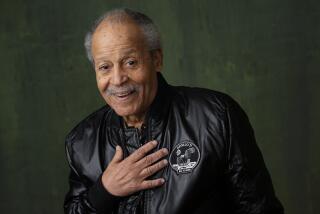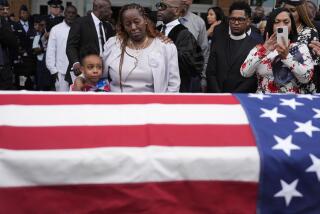Benjamin O. Davis Jr., 89; First Black Air Force General Led Tuskegee Airmen
Benjamin O. Davis Jr., a pioneering military officer who led the fabled Tuskegee Airmen during World War II and was the first African American to become a general in the Air Force, has died. He was 89.
Davis died July 4 at Walter Reed Army Medical Center in Washington of complications from Alzheimer’s disease.
In a career that began in the days of segregation, Davis, who was born in the nation’s capital and lived there much of his life, compiled a long history of achievements and accomplishments. His combat record and that of the unit he led have been credited with playing a major role in prompting the integration of the armed services after World War II.
In 1970, after his retirement from the Air Force, he supervised the federal sky marshal program that was designed to quell a rash of airliner hijackings. In 1971, he was named an assistant secretary of transportation.
At the time he left the Air Force as a lieutenant general, wearing three stars, he was the senior black officer in the armed forces. In 1998, President Clinton awarded Davis a fourth star, advancing him to full general.
“Gen. Davis is here today as living proof that a person can overcome adversity and discrimination, achieve great things, turn skeptics into believers; and through example and perseverance, one person can bring truly extraordinary change,” Clinton said.
As wartime commander of the 332nd Fighter Group, Davis and his pilots escorted bombers on 200 air combat missions over Europe, flying into the teeth of Nazi air defenses.
It was one of the fighter group’s proudest achievements that not one of the bombers it protected was lost to an enemy fighter.
This dazzling success was a tribute both to the pilots’ skill and to Davis’ leadership, according to historian Alan Gropman.
Davis was a natural leader, a stern disciplinarian and an officer with a clear idea of what his mission was and how to carry it out, said Gropman, an author and chairman of the department of grand strategy and mobilization at the Industrial College of the Armed Forces.
Other escort units, according to Gropman, ranged widely to search out enemy fighters. Davis “told his men to stay with the bombers” they were assigned to protect. “They were not out looking for glory. They were out to do their mission.”
Davis flew 60 missions in P-39, P-40, P-47 and P-51 fighters.
By the time he was assigned to lead the all-black unit, nicknamed the Tuskegee Airmen for the Alabama base where they had trained, Davis had withstood stern tests of his character, self-discipline and determination.
According to Gropman, when Davis graduated from the U.S. Military Academy at West Point, N.Y., in 1936, he was only the fourth African American ever to do so.
At the academy, Davis was shunned. Other cadets refused to speak with him except for official reasons. By some accounts, this persisted throughout his first year. However, Gropman said the silent treatment continued throughout all four years at West Point. Davis had no roommate in the dormitory and no one else assigned to his tent in the field.
Davis’ father, Benjamin O. Davis Sr., was one of two black combat officers in the Army and eventually was promoted to brigadier general. His son decided that he wanted to become a pilot and to attend West Point. There, he refused to give in to the harassment, Gropman said.
“I wasn’t leaving,” Davis told Gropman. “This is something I wanted to do, and I wasn’t going to let anybody drive me out.”
After graduation, there were no aviation openings for Davis and no black units for him to join. He took other assignments in the Army until President Franklin D. Roosevelt decided in 1940 to create an African American squadron in the Army Air Corps. Davis was chosen for command.
He earned his wings in 1942 and was sent the next year to North Africa to lead the 99th Fighter Squadron.
Davis had long resented and opposed segregation. But as leader of the Tuskegee Airmen, he insisted that those under him refrain from demonstrating against its injustices. Instead, according to Gropman, he took the position that there was a war to be won and that the time to protest would come afterward.
“He always believed in integration,” Gropman said.
In 1947, the Air Force was made a separate service. One of its generals conducted a study of segregation in the service and recommended integration. According to Gropman, a principal argument for it was the record of Davis and his pilots in proving that blacks could perform as well as whites in all jobs. The Air Force integrated in 1949.
Davis retired as deputy commander in chief of the U.S. Strike Command.
His wife, Agatha, died this year.
Survivors include a sister.
More to Read
Sign up for Essential California
The most important California stories and recommendations in your inbox every morning.
You may occasionally receive promotional content from the Los Angeles Times.










